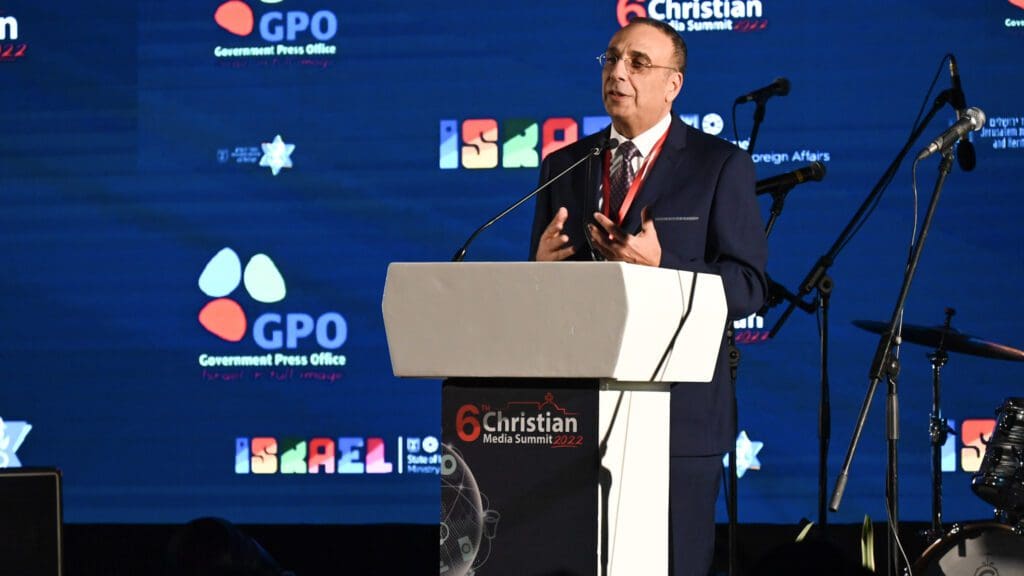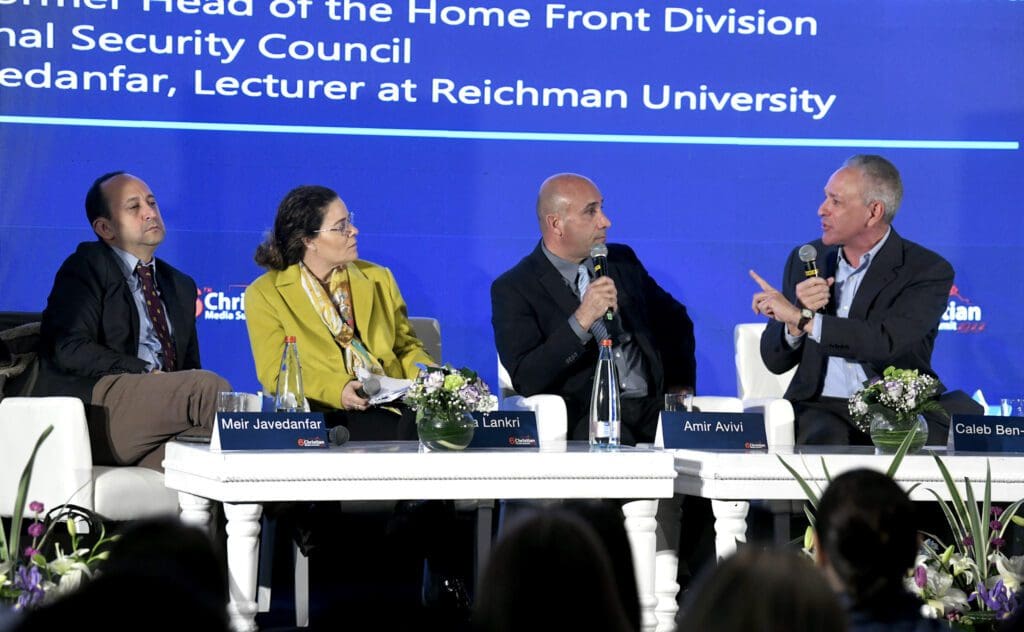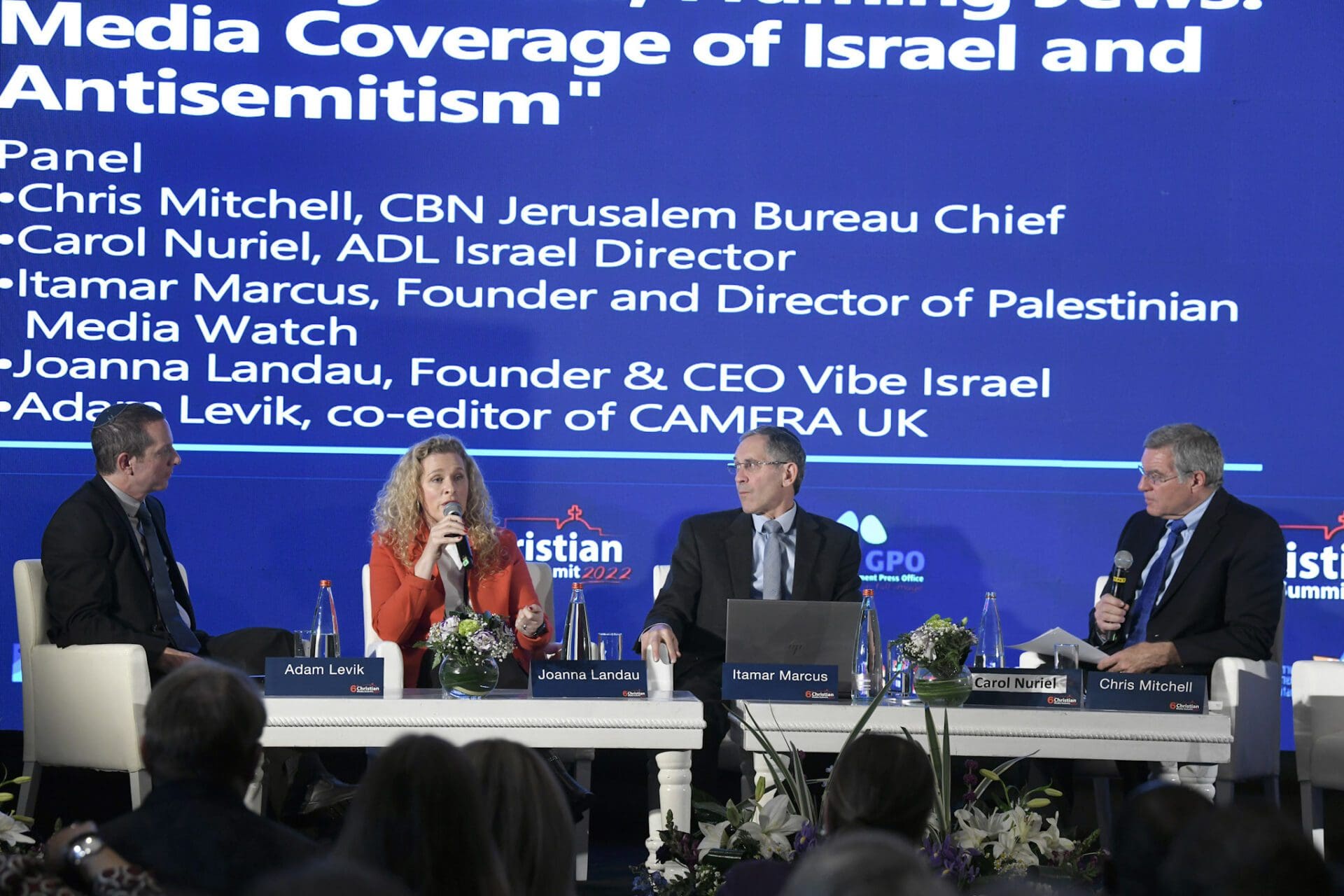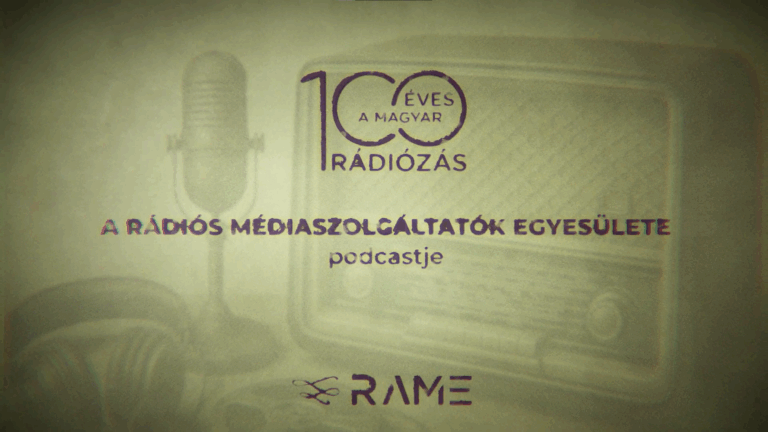The Israeli Government’s Press Office held its sixth Christian Media Summit from 11 to 14 December 2022. Summit participants included Israeli officials, Knesset members, Israeli media personalities, representatives of the Israeli Defence Forces, and pro-Israel NGOs.
The CMS is an annual event that brings together 150 top-tier Christian news executives and public opinion leaders worldwide for dialogue on key topics relevant to Israel and the Christian world. It aims to achieve a better understanding and strengthen the friendship and alliance between the State of Israel and Christians around the world.[i] This year, the Summit was held in person for the first time since the COVID-19 pandemic. I had the opportunity to participate and represent Hungarian Conservative and the Danube Institute.
At the opening event Nitzan Chen, the director of the GPO highlighted that Christian opinion in the media is crucial in fighting back against anti-Semitism and anti-Israel fake news. He said: ‘It’s very important for us to recognise and acknowledge the unique contribution that Christian media has served over the past few years throughout the pandemic. (…) You are representatives and shepherds of public attitude and have the unique and critical position as mediators in public opinion, providing reliable information…and understanding of the real facts on the ground.’

President of the International Christian Embassy in Jerusalem Dr Jürgen Buehler spoke about the importance of Israel’s 75th year of independence. He quoted Sir Edward Nicholas, who stated in 1648–exactly 3000 years before the Jewish State was established–that ‘The event that would be the most momentous of all history would be the coming restoration of Jews back to Palestine.’ Sir Nicholas’s attitude toward the Jewish people was a great shift from the common anti-Semitic medieval view that the ‘Jews constituted “the spawn of Satan” and were worthy of torture, genocide, and expulsion.’[ii] Dr Buehler added that the 75th anniversary is significant as ‘Abraham was 75 years old when he entered the land of Israel, the promised land, for the first time. For these 75 years and even before, Christians around the world have been standing with great faithfulness and support with the Jewish people in establishing this great nation.’
The last panel of the opening night was a special and essential dialogue between Bishop Robert Stearns, the founder of the Eagle Wings Ministry and Rabbi David Rosen, director of the American Jewish Committee. Rabbi Stearns started with the following thought: ‘Jewish suspicion of Christianity is less to do with theology and more with historical experience. The more Jews discover Christians as sisters and brothers, the more Jews are able to overcome the wounds of the past and see the special relationship in the family of Abraham and Israel and recognize the special connection to our shared biblical roots of the Old Testament. We’re blessed to live in an age when it’s happening.’ Bishop Stearns added:
‘Although Christians and Jews have a very different understanding of the Messiah, we’re all united in the faith that the Messianic age is coming and we can unite in faith together and work for the coming of that blessed time.’
Rabbi Rosen highlighted Israeli-Russian philosopher of religion Martin Buber’s role in pioneering Christian-Jewish dialogue. Rabbi Rosen quoted Buber as having said: ‘We have in common a book and a hope, and that is no small thing.’ Rabbi Rosen noted that Christians need to know their Jewish roots, and although Judaism doesn’t have Christian roots, it should relate to Christianity in terms of the ‘universal message that Christianity brings to humanity from its Jewish roots.’
In his closing speech, Bishop Stearns called attention to the saddening fact that there is a massive drop in the support for Israel, especially among evangelical Christians, an extraordinary rise of anti-Semitism, and an attack on freedom of speech, liberty, and fundamental values that are important for the Judeo-Christian worldview. Rabbi Rosen ended the night with the request to the Christians not to see the Jewish people as ‘demi-gods, faultless, inerrant and some kind of instrument of an eschatological agenda’ as this is the other side of the coin of anti-Semitism, which denies their identity to be human. He asked the Christians to be true friends who ‘applaud you when you do right and caution you when you do wrong, as that’s the expression of love.’
Although Israeli Prime Minister Benjamin Netanyahu was scheduled to deliver the closing speech, he could not attend due to his busy schedule. PM Netanyahu has often expressed gratitude to Israel’s Christian allies. In 2020, at the fourth Christian Media Summit, held online, he stated: ‘Israel has no Better Friends than Christians. Your help is much appreciated. (…) If anyone has been there all along, through thick and thin, it’s you. You’ve understood the historical imperative, this great honesty of the Jewish people coming back to their land, building up their State, rebuilding their capacity to create and defend their present and future. You’ve been extraordinary friends, champions of the right of the Jewish people and the land of Israel, and extraordinary champions of the truth. Keep praising the torch of truth because sooner or later, everybody will see it.’ [iii]
On the second day, speakers covered various topics about Israel’s culture, economy, politics, security, and human rights. After the talk of the executive producer of the highly popular Netflix series Shitshel, the first panel discussion focused on the Iran nuclear deal and how it affects Israel. Talya Lankri, chief of staff for the establishment of the National Guard and former head of the Home Front Division in the National Security Council, Brigadier General (res.) Amir Avivi, Israel Defence and Security Forum, and Dr Meir Javedanfar, Iranian-Israeli lecturer, author, and commentator, shared their thoughts on the topic. According to Tayla Lankri the nuclear deal is not dead yet, it depends on how the Western World sanctions Iran, Dr Meir Javedanfar noted that the Iran Deal is over, but nobody wants to accept its ‘death certificate’. Dr Meir and General Avivi added that because the Iranian regime became close to Russia,
if Moscow won the Russo-Ukrainian war and gave resources to Iran, it would embolden the Iranian regime in how it treats Israel.
According to General Avivi, the Nuclear Deal is terrible as it states that ‘Iran will be able to be nuclear’, and once it’s finished, they can have as many nuclear bombs as they wish. Tayla Lankri and General Avivi agreed that the Iranian Regime is the most pressing security issue for the Israeli government, and the IDF must prepare to launch an attack on the Iranian nuclear facilities and convince the US about why that is necessary.

As mentioned in a previous article, in 2022, the UN passed 15 resolutions against Israel and only 13 against the rest of the world. A panel discussion on Day 2 was dedicated to the unfair international treatment of Israel. The panellists included pro-Israel activists and advocates who talked about why Israel is treated unfairly in the international community and how we can effectively fight back anti-Israeli lies. Ofir Dayan shared her experiences fighting for Israel at Columbia University, known as the ‘worst school for Jewish students’. She told the audience how she experienced anti-Semitic bullying from a crowd of pro-Palestinian students who surrounded her and shouted, ‘from the River to the Sea, Palestine will be free.’ She noted that security staff didn’t help her because the legitimacy of the Jewish State had become a sensitive political issue at the university. To defend the State of Israel, she put the story of her country in the following terms: ‘It’s a story of indigenous people that lived in their land and were kicked out by colonisers. They were enslaved, persecuted and almost wiped out for almost two thousand years. It’s the only example in world history when such a nation was able to come back to their homeland and establish a sovereign state.’ She added that in fighting for Israel, it’s really important to be honest as that’s the only way to remain credible. Social media influencer Hananya Naftali agreed, adding that
‘there’s no country that’s perfect, so there’s no need to distort the facts; we just have to tell the truth and share personal stories.’
(You can read Hungarian Conservative’s interview with Hananya Naftali here .)
Lt.-Col. Richard Hecht, IDF Spokesperson for the Foreign Media, gave a security brief in which he said his task is to build legitimacy to the IDF’s missions in the international sphere. For example, when the IDF first found Hamas’s terror tunnels in 2013–one year before the 2014 Gaza war, also known as the Protective Edge Operation–the tunnels were shown to journalists, foreign government officials and politicians. Lt.-Col. Hecht emphasised that the Abraham Accords have changed the regional security perspective of Israel, as the Israeli Army can cooperate with Arab countries they’ve been separated from before. As for the main security threats for Israel in the region, Lt.-Col Hecht named Iran, Syria, Hezbollah, the Gaza Strip and Russia. In terms of the Palestinian–Israeli conflict, he explained that until May 2021, the IDF’s strategy differentiated between Judea and Samaria–also known as the West Bank–and the Gaza Strip. It meant that because of the Oslo Accords, when the IDF recognized a threat in Judea and Samaria, they told the Palestinian Authority and allowed them to handle it. Lt.-Col Hecht also highlighted that since 2021, the Palestinian Islamic Jihad–a new Iran-backed terror organisation that aims to annihilate Israel and create an Islamic Palestinian state–has gained more power in the West Bank, especially in Jenin and in Gaza. Even though the IDF repeatedly cautioned and asked the Palestinian Authority (PA) to act on the terrorist threats that the Palestinian Islamic Jihad poses to Israel, the weakened PA has chosen not to deal with the issue. In March 2022, two terrorist attacks against Israeli civilians were carried out from Jenin, and since then, a large number of terror attacks have come from the West Bank celebrated by the Palestinian Islamic Jihad and Hamas. Therefore, the IDF and other Israel security forces started to conduct counterterrorism operations to maintain Israel’s security. Lt.-Col Hecht emphasized that the IDF is fighting against terrorists in its missions and is not rushing down the whole West Bank in these operations.
The IDF isn’t fighting against Palestinian civilians, and it still allows Palestinians to cross to Israel.
However, the Palestinian terror organization didn’t care about civilian casualties as it launched more than 1100 rockets at Israel over the three days Operation Breaking Dawn conflict, some of which failed and caused the killing of several children and wounding many others in the Gazan refugee camp of Jabalia.
Gil Hoffman, Executive director of HonestReporting and lecturer on political strategy, gave a lecture on Israeli politics and talked about the false narrative spread in the mainstream media about Israel being a racist country, by highlighting certain statement by politicians like Itamar Ben Gvir and Netanyahu himself. He reminded that Ben Gvir wasn’t popular until he supported the idea of expelling Arabs from Israel. He added that the reason Ben Gvir rose is because he’s young and charismatic, the media gave him a lot of attention, and also because Israeli voters became disappointed in the last left-wing government. He noted that Netanyahu was re-elected because security and stability is the most important factor in Israel at each election.
The last panel discussed the media coverage of Israel and anti-Semitism. Itamar Marcus, founder and director of Palestinian Media Watch, introduced his organization’s new report at the Summit titled ‘Teaching terror to tots’ that deals with how the children’s educational magazine called Waed (Arabic for ‘Promise’) of Fatah–the ruling political movement of the Palestinian Authority–teaches children aged 6–15 to hate and kill Israelis, and that the Jewish State has no history and no right to exists. The report is dedicated to the memory of Dalya Lemkus, a 26-year-old Israeli woman who was murdered by a Palestinian terrorist in 2014. ‘The terrorist first ran over Dalya, then got out of his car and, while Dalya was lying helplessly on the ground, he stabbed her repeatedly until she died. Waed teaches Palestinian children that her murder was “a heroic car ramming,” and that the terrorist who murdered her “has the most beautiful smile”.’ [iv]
Itamar Marcus highlighted that although the Obama administration established the office of a Special Representative to tackle anti-Semitism, when he had a meeting with representative Hannah Rosenthal and asked what can they do about Palestinian anti-Semitism, she answered ‘We can’t do anything about it, because the US State Department can deal with anti-Semitism in every place in the world except in the Palestinian Authority.’
Adam Levik, the co-editor of CAMERA UK, highlighted that the International Holocaust Remembrance Alliance’s definition of anti-Semitism is the most accepted worldwide. The IHRA definition is the following: ‘Anti-Semitism is a certain perception of Jews, which may be expressed as hatred toward Jews. Rhetorical and physical manifestations of anti-Semitism are directed toward Jewish or non-Jewish individuals and/or their property, toward Jewish community institutions and religious facilities.’[v] Levik named the most common anti-Semitic tropes in the mainstream media: the ‘Dual Loyalty’ trope that claims that ‘those Jewish people who live in the diaspora are more loyal to Israel than to their own countries’; the argument that the ‘Jews are too powerful and successful and have too much influence on Western politics’; the ‘blood libel’ trope–that is the myth that Jews murder non-Jewish children and sacrifice and use their blood–which also occasionally appears in mainstream media outlets. As an example, Levik mentioned the 2003 cartoon during the Second Intifada that pictured Prime Minister Ariel Sharon eating a Palestinian baby, which not just appeared in The Independent but was voted ‘cartoon of the year 2003’.
The day ended with a celebratory dinner at the Western Wall with Mayor of Jerusalem Moshe Lion. The mayor greeted the participants with the following remarks: ‘Jerusalem is the capital of Israel and a place of co-existence. This is a city of peace. Friends, since I became a mayor, I work to help build these bridges between the different communities in Jerusalem. I know you stand up for Jerusalem and it’s my great pleasure to welcome you unto Jerusalem.’
On the third day, participants travelled to Southern Israel for a close look at an Israeli army base and life at the Gaza border. On the last day of the Summit, we visited the City of David archaeological centre and the Knesset. You can read about these two eventful days next week on Hungarian Conservative.
[i] Christian Media Summit, ‘About’, Government Press Office, (2022), https://www.cms-israel.com/ , accessed 9 January 2023.
[ii]Michael Medved, ‘I Will Make of You a Great Nation’, Commentary, (November 2019), https://www.commentary.org/articles/michael-medved/i-will-make-of-you-a-great-nation/ , accessed 9 January 2023.
[iii] Governement Press Office, ‘Prime Minister Netanyahu at the 4th Christian media summit’, Youtube, (2020), https://www.youtube.com/watch?v=oIWMWbJ-cxA, accessed 10 January 2023.
[iv] Itamar Marcus, ‘Teaching Terror to Tods’, (August 2022), https://palwatch.org/Storage/Special-Reports/Teaching-Terror-to-Tots-digital.pdf , accessed 11 January 2023.
[v] Holocaust Remembrance Alliance, ‘The working definition of antisemitism’, Holocaust Remembrance Alliance, https://www.holocaustremembrance.com/resources/working-definitions-charters/working-definition-antisemitism, accessed 11 January 2023.
.








